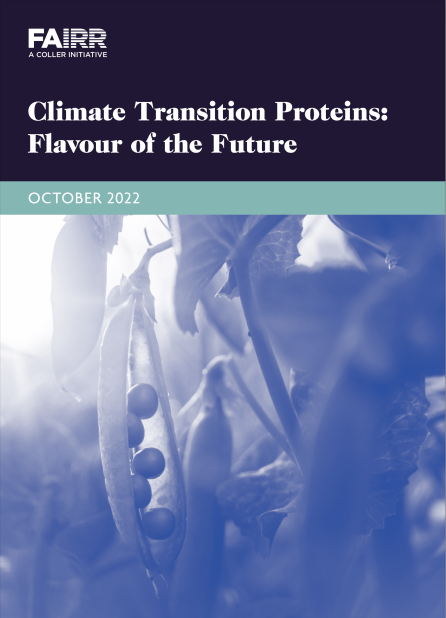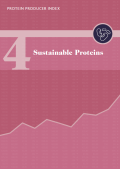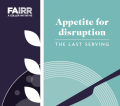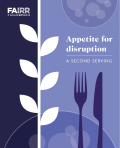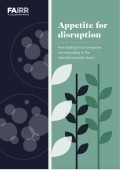Report Overview
FAIRR’s engagement with 23 of the largest global food manufacturers and retailers has acted as a catalyst to lead companies to take action on a challenging topic not previously considered a corporate sustainability priority. Today, portfolio diversification is recognised as a material business issue by all companies. The aim of this engagement is for industry peers to align with best practices and foster a sustainable, nutritious, and just global food system transition.
The report focuses on sustainable proteins as a key mitigation opportunity for retailers and manufacturers, given the abatement potential of diversifying away from animal-based to plant-based proteins.
It is in this context that the report analyses how companies in 2022 have worked towards (i) setting time-bound commitments to grow the share of sustainable and nutritious plant-based and alternative proteins/ingredients in product portfolios; (ii) enabling consumers to make more sustainable and nutritious dietary choices which incorporate a diverse array of protein sources, and; (iii) disclosing progress towards these goals.
Additionally, the report provides in-depth analysis of the alternative protein market and the regulatory environment in 2022.
Report Highlights
The first half of the report provides investors with an update for 2022 on the alternative proteins market summarising developments based on FAIRR’s own research and analysis of the sector.
Moreover, FAIRR analyses how policymakers can step up their game to support the food system transition. Regulatory changes supporting a 1.5-degree warming trajectory will play a key role in further developing the sector. Regulatory approval for novel foods and sizable public investments are needed to de-risk food technologies.
The second half of the report is a summary of engagement progress with the 23 companies in 2022.
The number of companies setting targets to diversify protein portfolios continues to increase. In 2022, 35% of the engagement companies have committed to increasing the volume or sales of meat and/or dairy alternatives. This figure is up from 28% in 2021 and 0% in 2019. Companies are increasingly investing in building internal capabilities and systems to track data; more are disclosing metrics. 39% of companies reported at least one metric showcasing the shift of their product portfolio, up from 32% in 2021 and 0% in 2019.
Only 5 out of the 16 companies that have net-zero targets, cover Scope 3 emissions and have set a portfolio diversification target. This is an issue as on average, animal agriculture accounts for around 33% of total GHG emissions for engagement companies. Most companies are missing the opportunity to mitigate negative environmental impacts in their supply chain by not exploiting the connection between protein diversification and climate mitigation.
48% of companies have a neutral outlook, meaning they are on track to maintain rather than accelerate improvement. Nevertheless, 35% of engagement companies have a positive outlook, as there is evidence that these achieved considerable progress and will continue with an upwards trajectory in the next 12-18 months.
All companies in the engagement are investing in developing plant-based products – deemed one of the fastest-growing categories. Examples hint at fermented-enabled protein becoming the next preferred technology; engagement companies collaborate directly with food tech start-ups to incorporate novel technologies into their portfolios.
There is still substantial diversity in the nutritional content. Nutrition integration into alternative protein portfolios has progressed, but efforts within this area have been inconsistent, resulting in variable nutritional profiles.
Consumer engagement continues to be the lowest-performing area for companies in this engagement, given the lack of an overarching strategy to accelerate consumer uptake. Nevertheless, once seen as a premium-priced indulgence, engagement companies are now making concerted efforts to increase alternative proteins’ accessibility and affordability.
The findings of this report can help investors:
Build a view of the alternative protein market today, the current regulatory environment, and the future outlook of the sector.
Quantify the climate mitigation potential of alternative proteins and their broader environmental impact, relative to animal-derived proteins.
Better understand how retailers and manufacturers are diversifying protein portfolios to build resilience towards and mitigate their impact on the climate.
Downloads
Public Report
Partial state of the market analysis
Breakdown of the methodology
General analysis
Full state of the market analysis
Industry best practice
General analysis with company examples
Individual company analysis
Overall trends and conclusions
Public ReportMembers' Report
Full state of the market analysis
Industry best practice
Breakdown of the methodology
General analysis with company examples
Individual company analysis
Overall trends and conclusions

